
LYANTONDE, Uganda — Former Inspector General of Police Gen. Kale Kayihura, in an interview with the state-owned New Vision newspaper, has defended his nearly 13-year tenure as head of the Uganda Police Force, addressing allegations of torture and brutality that marked his time in office.
Kayihura, who was dismissed by President Yoweri Museveni in March 2018, spoke from his rural home in Lyantonde district, according to the New Vision.
Responding to criticism that his leadership was characterized by abuses against the opposition, Kayihura told the New Vision, “Well, it is not me to judge, but what I can say is that I left the Police force better than I found it and I left policing better than I found it.” He highlighted improvements in police numbers, equipment, and professionalism during his tenure, while acknowledging that he is open to criticism for any shortcomings.
According to the New Vision, Kayihura defended his policing methods during political events, stating his approach involved “engagement to a fault” when faced with provocation. He also addressed the controversy surrounding the Nalufenya detention facility, dismissing reports of inhumane conditions as “malicious,” the New Vision reported. He said the facility was initially a police station that was repurposed as a coordination center for counter-terrorism efforts.
When asked about accusations of being used by President Museveni to suppress the opposition, Kayihura told the New Vision, “Of course, I was deployed by the President, but the President does not deploy you to use unlawful methods. He expects you to enforce the law.” He suggested his strategies, which sometimes involved preemptive measures and intelligence gathering, aimed to minimize public inconvenience and avoid harsher tactics, according to the interview.
Reflecting on his dismissal, Kayihura, described as a disciplined officer in the New Vision report, said, “The President is the one who appointed me. That’s how it works in our system. I never applied for the job.” He admitted to the New Vision that adjusting to life outside the police force, particularly dealing with what he described as negative media portrayals, was challenging. However, he has found solace in farming at his rural home, viewing it as a continuation of public service.
Kayihura also addressed the sanctions imposed on him by the United States and the United Kingdom, telling the New Vision they have had little practical impact as he possesses no assets abroad. He questioned the reasoning behind the sanctions, suggesting he was a “low-hanging fruit” in a broader political context.
Looking back at his 41-year military career, Kayihura identified his arrest in June 2018 as the biggest challenge, a matter he chose not to elaborate on with the New Vision, but expressed gratitude that the military justice system ultimately cleared him. He cited his five-year experience in the Luwero bush war as a life-changing moment that solidified his belief in the power of the people.
When asked by the New Vision if he harbored any regrets, Kayihura quoted Archbishop Desmond Tutu, emphasizing the importance of learning from mistakes rather than dwelling on them. He concluded by telling the newspaper his focus is on inner peace, knowing he did his best during his time in service. “The most important accountability is to yourself. I have inner peace because I know I did my best,” he affirmed.










Discussion about this post